Rural Economy and Connectivity Committee: Session 5 Legacy Report
Previous Committee Members
Note: Previous Members of the Committee in session 5 were as follows:
Mairi Gougeon (née Evans) (from September 2016 until March 2017)
Kate Forbes (from April 2018 until June 2018)
Rhoda Grant (from the start of Session 5 until January 2018)
Jamie Greene (from the start of Session 5 until February 2020)
Rachael Hamilton (from February 2020 until August 2020)
Emma Harper (from the start of Session 5 until September 2016)
Fulton MacGregor (from March 2017 until April 2018)
John Mason (from the start of Session 5 until September 2019)
Oliver Mundell (from August until December 2020)
Gail Ross (from the start of Session 5 until September 2019)
Introduction
This legacy report is addressed to the Rural Economy and Connectivity Committee’s successor committee(s) in the hope that it may prove useful as part of the consideration of forward work programmes for Session 6 and the conduct of committee business.
The paper records the main pieces of work which the Committee undertook during Session 5. The paper then identifies some work which may be required to be carried out in Session 6, as well as some outstanding or ongoing work which the Committee believes its successor committee(s) might wish to consider undertaking. It provides a brief overview of external engagement activities undertaken by the Committee during Session 5 in conjunction with the Parliament's Community Outreach team. Finally, it concludes with some reflections on lessons learned from the Committee's remit, workload and working practices during Session 5.
REC Committee Session 5 in numbers
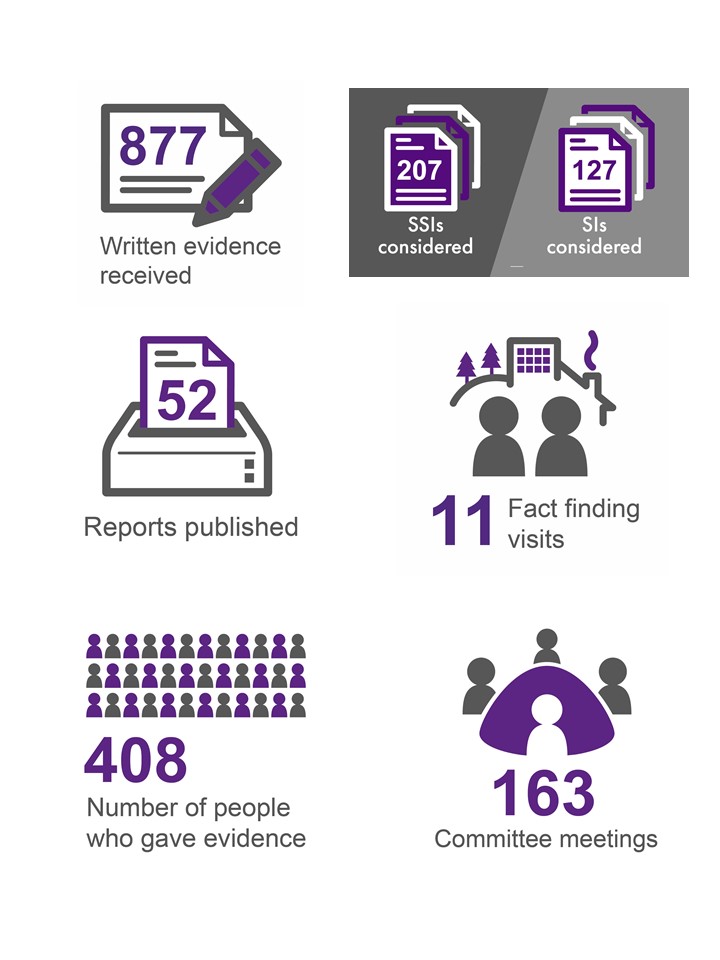
Activity during the Fifth Session
The Committee has had a full programme of work during the fifth session of the Parliament encompassing all aspects of its wide-ranging remit. The Committee’s main pieces of work are recorded below.
Legislation
Scottish Government Bills
The Committee was the lead committee in respect of the following bills introduced by the Scottish Government–
Agriculture (Retained EU Law and Data) (Scotland) Bill
Made provision to provide the Scottish Ministers with regulation-making powers to amend or replace the European Union (EU) Common Agricultural Policy (CAP) elements of retained EU law in Scotland, and to provide new powers for the collection and processing of agricultural data. This Bill became an Act on 1 October 2020.
Forestry and Land Management (Scotland) Bill
Made provision about Scottish Ministers’ functions in relation to the management of forestry land and other land; and for connected purposes. This Bill became an Act on 1 May 2018.
Islands (Scotland) Bill
Made provision to create a statutory duty to develop a National Islands Plan and to impose duties in relation to island communities on certain public authorities; made provisions about the electoral representation of island communities and established a licensing scheme in respect of marine development adjacent to islands. This Bill became an Act on 6 July 2018.
South of Scotland Enterprise Bill
Made provision to establish a South of Scotland Enterprise agency and to provide for its functions. This Bill became an Act on 12 July 2019.
Transport (Scotland) Bill
Made provision for low emission zones; for and in connection with the powers of local transport authorities in connection with the operation of local bus services in their areas; about arrangements under which persons may be entitled to travel on local bus and other transport services; to prohibit the parking of vehicles on pavements and double parking; in connection with the status of the office of the Scottish Road Works Commissioner, the Commissioner’s functions and the regulation of works; and in connection with regional Transport Partnerships and to adjust the number of members on the British Waterways Board. This Bill became an Act on 15 November 2019.
Non-Government Bills
In addition, the Committee was the lead committee in respect of the following non-government bills introduced by members of the Scottish Parliament–
Seat Belts on School Transport (Scotland) Bill
Made provision for a legal requirement to fit all dedicated home-to-school transport service vehicles with seat belts. This Bill became an Act on 18 December 2017.
Restricted Roads (20 mph Speed Limit) (Scotland) Bill
Made provision to reduce the default speed limit on restricted roads, generally residential streets and minor roads in urban areas, from 30mph to 20mph. This Bill fell at Stage 1 on 13 June 2019.
Dogs (Protection of Livestock) (Amendment) (Scotland) Bill
Made provision to strengthen and update the law in relation to so-called “livestock worrying” – in which sheep or other farm animals are chased, attacked or killed by dogs. At time of writing, the Stage 3 debate on the Bill was scheduled to take place on 24 March 2021 with a number of amendments tabled.
Inquiries
During Session 5, the Committee carried out inquiries on the following subjects–
Review of priorities for crofting reform
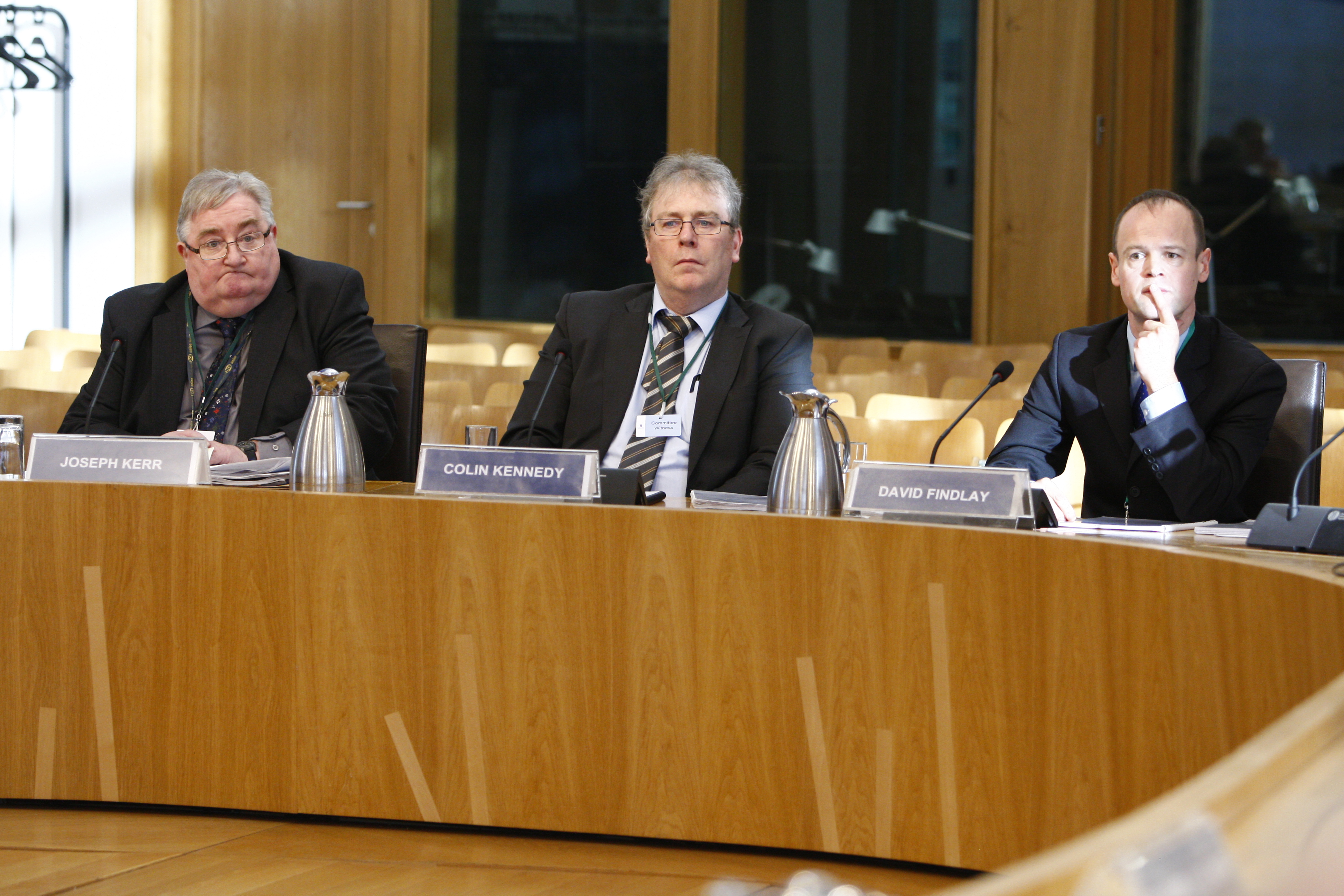
Representatives of the Crofting Commission giving evidence to REC Committee, November 2016
During late 2016 and early 2017, the Committee agreed to undertake a short, focused review of priorities for crofting law reform with the objectives of assessing current activity by stakeholders and the Scottish Government in working towards a reform of crofting law, identifying areas of priority and recommending any action the Committee considered necessary to progress and complement the reform process.
The Committee received 14 submissions in response to its call for views. As part of this work the Committee held four evidence sessions in November 2016, during which it heard evidence from crofting stakeholders and academics.
The Committee published a report on its Review of Priorities for Crofting Law Reform on 9 March 2017 and received a response from the Scottish Government on 31 March 2017. This was followed by a debate in the Chamber on 2 May 2017.
Salmon farming in Scotland
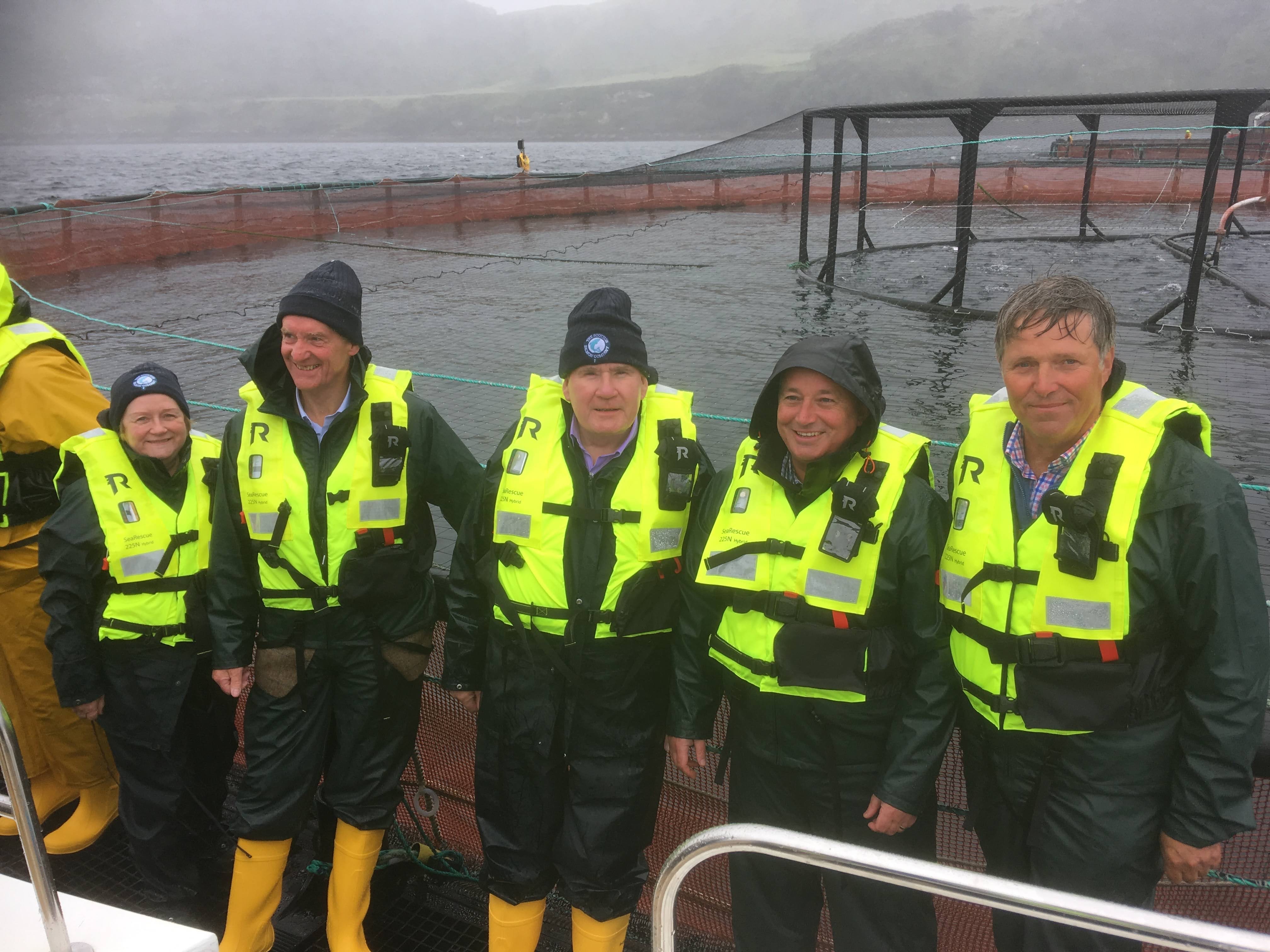
REC Committee visit to a fish farm
Launched at the beginning of 2018, the remit of this inquiry was to consider the current state of the salmon industry in Scotland, to identify opportunities for its future development and to explore how the various fish health and environmental challenges it currently faces can be addressed.
A call for written evidence was published and 161 submissions were received.
Six evidence sessions were held with aquaculture research bodies, environmental and fishing organisations, regulatory bodies, development bodies, salmon farming representatives and the Cabinet Secretary for the Rural Economy and Connectivity. The Committee also invited major supermarket retailers to provide oral evidence as part of the inquiry, however none accepted the invitation to appear before the Committee.
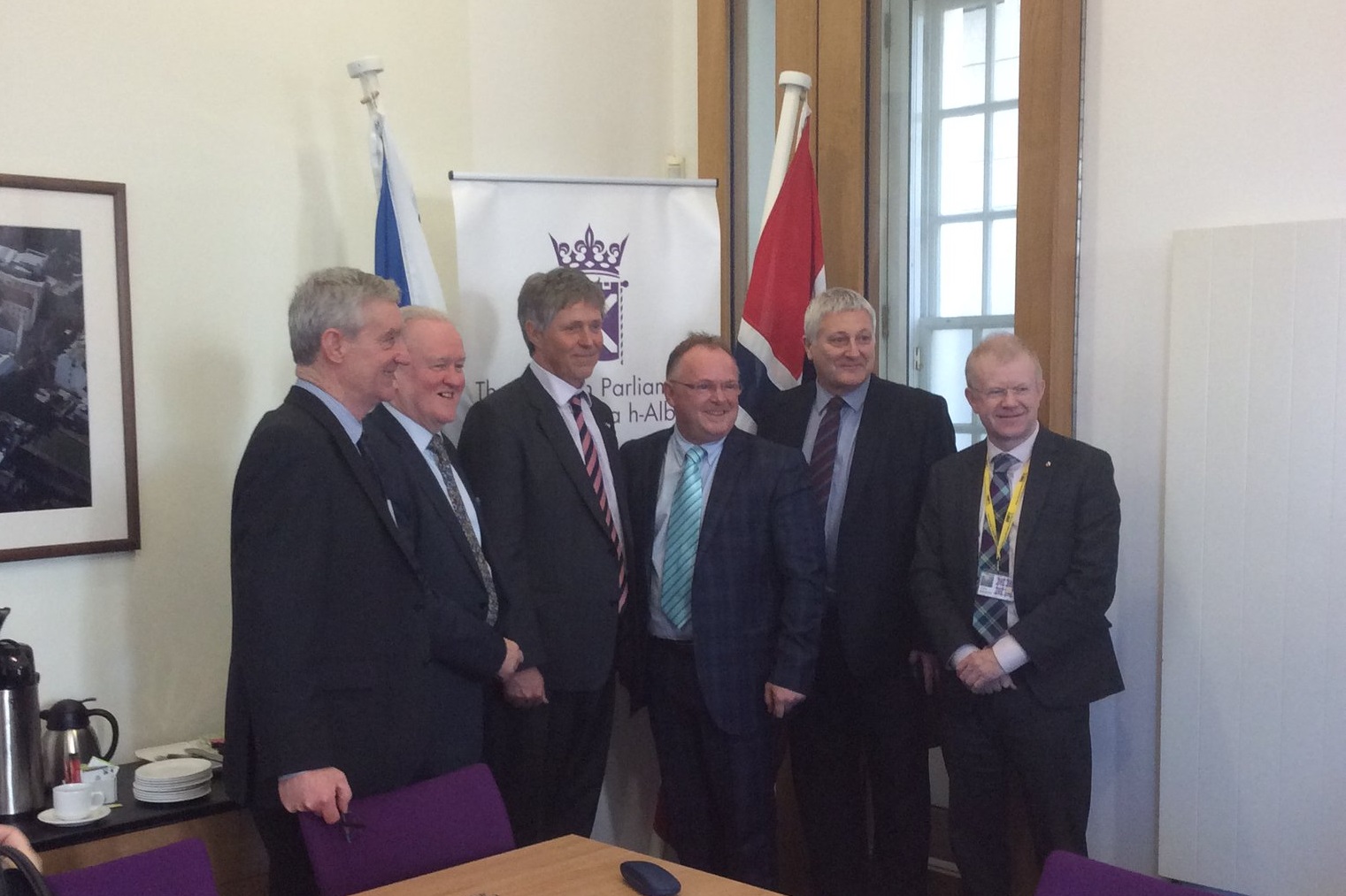
REC Committee meeting with former Norwegian Minister for Fisheries, Per Sandberg
As part of its evidence gathering, the Committee met with the former Norwegian Minister of Fisheries, Per Sandberg and took part in a video conference with the Aquaculture Stewardship Council. Committee members also visited a wild fishery, salmon hatcheries and salmon farms to discuss issues relevant to the inquiry.
The Environment, Climate Change and Land Reform Committee carried out a related inquiry into the environmental impacts of salmon farming, to contribute towards the Committee’s broader inquiry. The ECCLR Committee’s conclusions were incorporated into the REC Committee’s inquiry report.
The Committee published its report on the inquiry on 27 November 2018. It received two responses to its report from the Cabinet Secretary for the Rural Economy and the Scottish Environment Protection Agency.
In November and December 2020, the Committee took evidence from two stakeholder panels and subsequently from the Cabinet Secretary for the Rural Economy and Tourism and supporting officials to explore what progress had been made in the intervening two years in implementing the Committee’s recommendations.
Construction and procurement of ferry vessels in Scotland
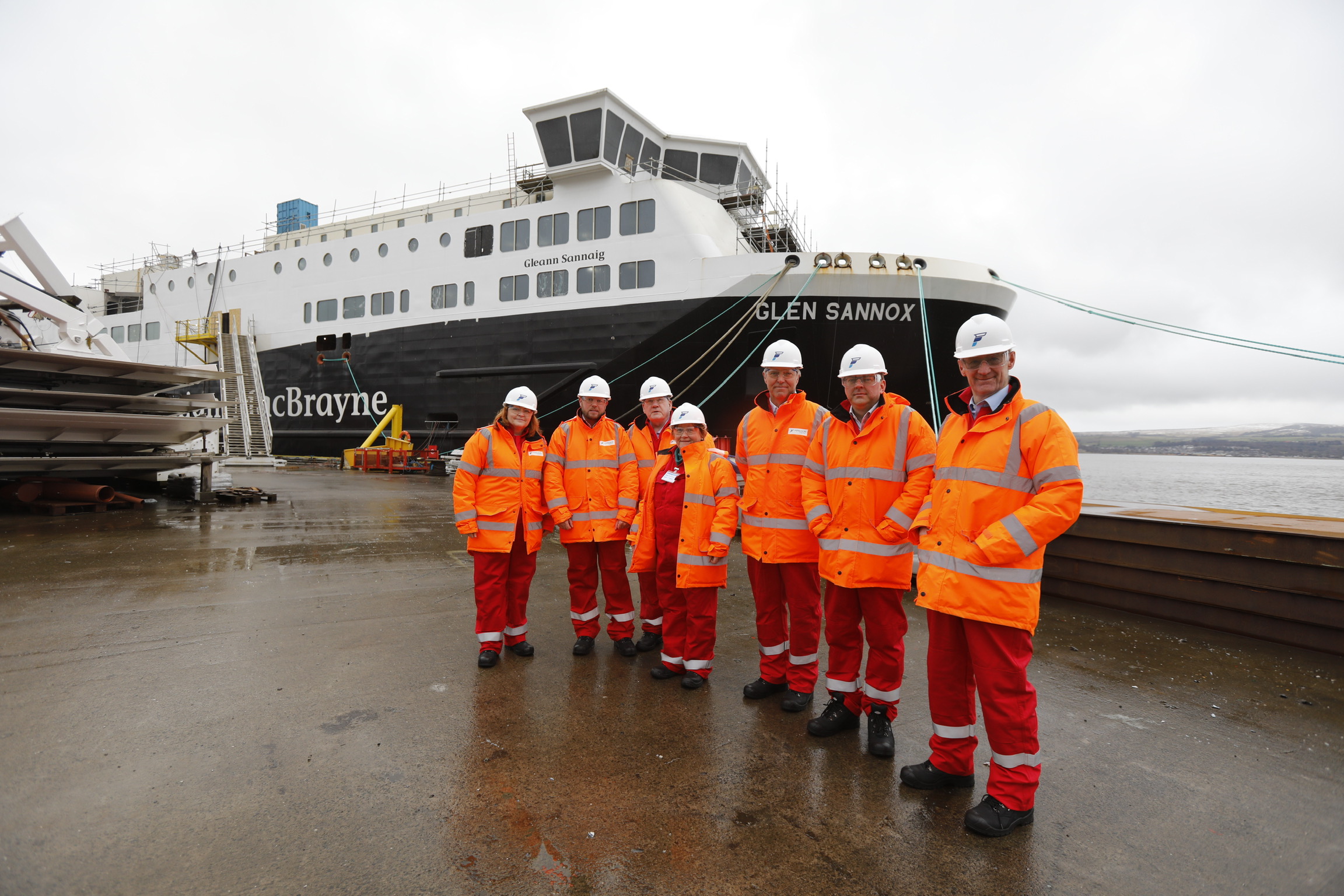
REC Committee visit to the Ferguson Marine shipyard, February 2020
In late 2019, the Committee agreed to hold an inquiry into the construction and procurement of ferry vessels in Scotland. The remit of this inquiry was to identify and address current and future challenges and opportunities in the procurement of new vessels to support Scotland’s ferries network.
As part of this work, the Committee agreed to consider the updated timetable and costs associated with the completion of vessels 801 and 802 by the Ferguson Marine shipyard which was subsequently taken into public ownership in December 2019.
The Committee took evidence on the inquiry between January and March 2020, at which point its work was interrupted by the Covid-19 pandemic. Members visited the Ferguson Marine shipyard in February 2020, where they met with the senior management team and employees.
The Committee took further evidence on the inquiry in August 2020 and published its final report on 9 December 2020. The Scottish Government issued its response to the Committee’s inquiry report on 25 January 2021, prior to a Chamber debate on the inquiry which took place on 2 February. The Committee subsequently took evidence from the Minister for Energy, Connectivity and the Islands at its meeting on 3 March 2021 on the latest position regarding the cost and timetable for completion of vessels 801 and 802 and broader aspects of ferries policy.
Other Work
The Committee has undertaken work in a broad range of other areas during the course of Session 5. These pieces of work have included–
Financial scrutiny
Annual financial scrutiny related to the Scottish Government budget, including a focus on:
forestry and broadband connectivity as part of its scrutiny of the 2017-18 Draft Budget
support for Scotland’s food and drink sector as part of its scrutiny of the 2018-19 Draft Budget
investment to support Clyde and Hebrides ferry services as part of its scrutiny of the 2019-20 Draft Budget
the current approach to roads maintenance in Scotland and the adequacy of related funding levels as part of its scrutiny of the 2020-21 Draft Budget
implications of the COVID-19 pandemic for the rural economy and connectivity as part of its scrutiny of the 2021-22 Draft Budget.
Transport - infrastructure projects and policy
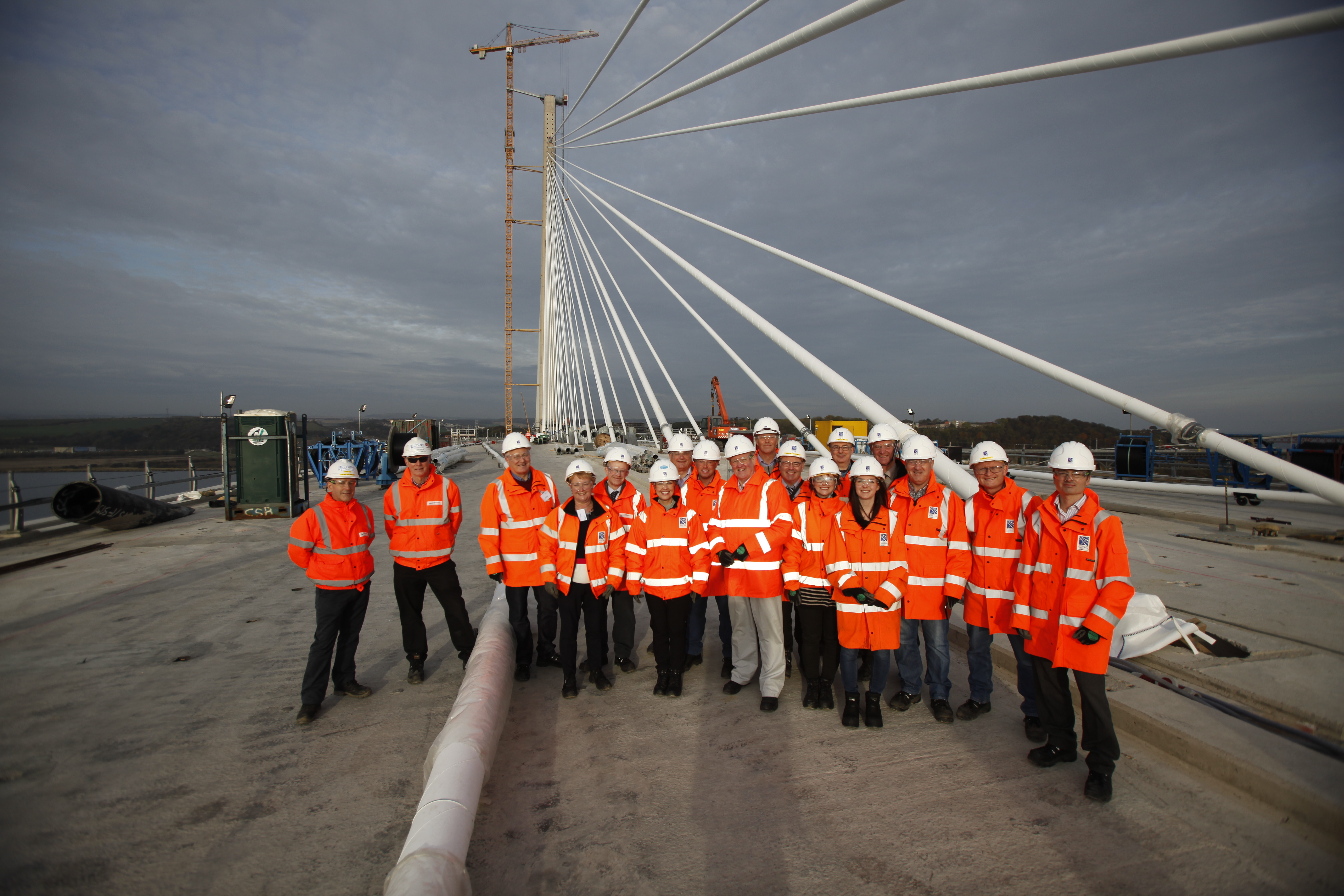
REC Committee visit to the Forth Replacement Crossing during construction
Monitoring progress in construction of the Forth Replacement Crossing and, following its completion and opening in August 2017, receiving regular updates on planned and ongoing works on the Queensferry Crossing and the Forth Road Bridge – including a one-off session in February 2020 with the Cabinet Secretary for Transport, Infrastructure and Connectivity on the Queensferry Crossing, following its closure on safety grounds due to falling ice.
Monitoring delivery of the Clyde and Hebrides Ferry Service including a visit in early 2019 to Ferguson Marine Engineering Limited to discuss progress on the construction by the shipyard of two new ferries for CMAL.
A one-off session on winter resilience related to the management of road and public transport systems during a period of severe winter weather in February and March 2018.
Progress updates on the Aberdeen Western Peripheral Route following the collapse of Carillion as part of the consortium contracted to deliver the project and subsequent delays to its completion and opening.
Monitoring the performance of rail services, rail service issues and the management of the rail network in Scotland, including the progress of developments such as the Edinburgh Glasgow Improvement Project and taking evidence from ScotRail on a number of remedial orders issued by the Scottish Government and rail service performance more generally.
Ongoing scrutiny of the management and performance of Scottish Government-owned Prestwick Airport including efforts to find a buyer to take the facility back into private ownership.
Climate Change
Scrutiny of those aspects of the Draft Climate Change Plan (RPP3) (published in 2017), and the Climate Change Plan update (CCPu) (published in late 2020) dealing with agriculture, forestry and transport sectors.
Islands policy
Scrutiny of the proposed National Islands Plan, a component of the implementation of the Islands (Scotland) Act 2018, during October and November 2019.
Agriculture
Regular updates on Common Agricultural Policy (CAP) financing and performance issues including the impact on farming businesses of a failure in CAP IT systems during 2017, which has been acknowledged and subsequently addressed by the Scottish Government.
Brexit
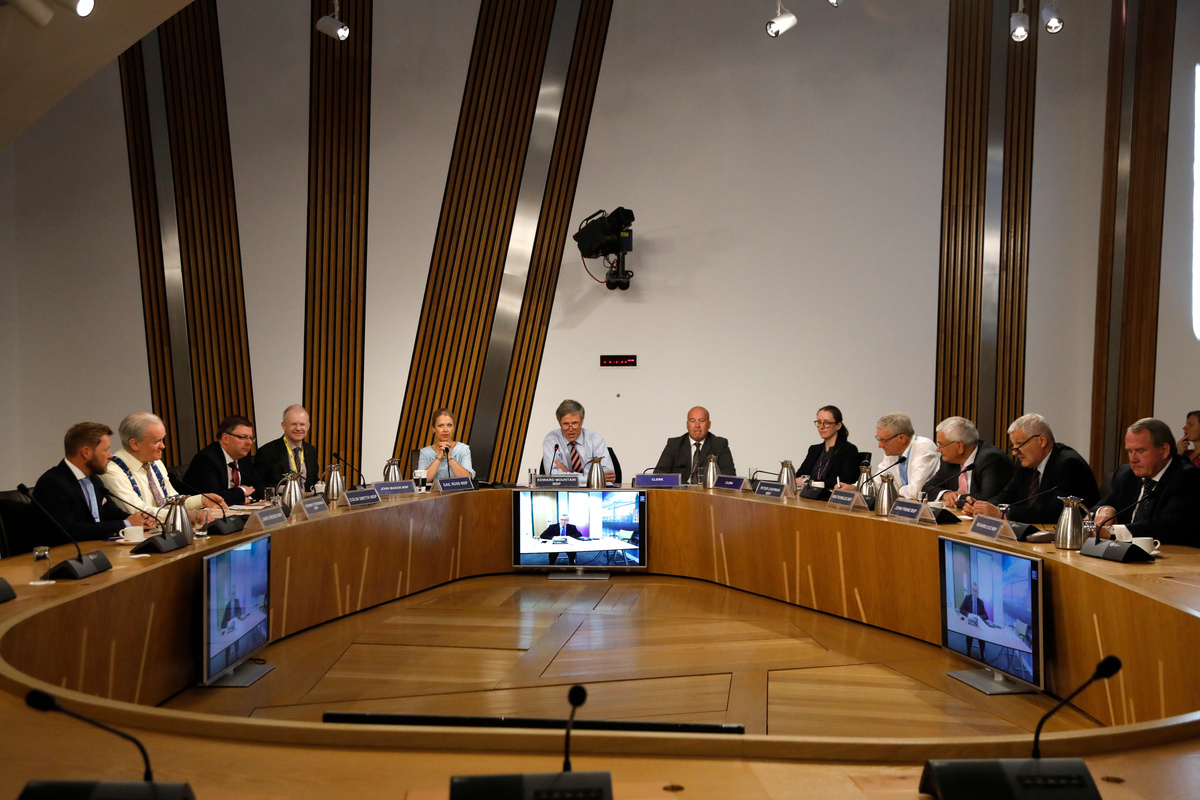
REC Committee video conference with then Secretary of State for Environment, Food and Rural Affairs, Michael Gove MP
Regular scrutiny of implications of the UK’s exit from the European Union for those sectors falling within the Committee’s remit including evidence sessions with consecutive UK Secretaries of State for Environment, Food and Rural Affairs, Michael Gove MP in June 2018 and George Eustice MP in November 2020. Following the end of the Brexit transition period, the Committee also took evidence from stakeholders in early 2021 about the impact of new requirements for products and produce exported to the European Union on Scottish exporters and supply chains in the agriculture, fisheries and aquaculture sectors.
Digital connectivity
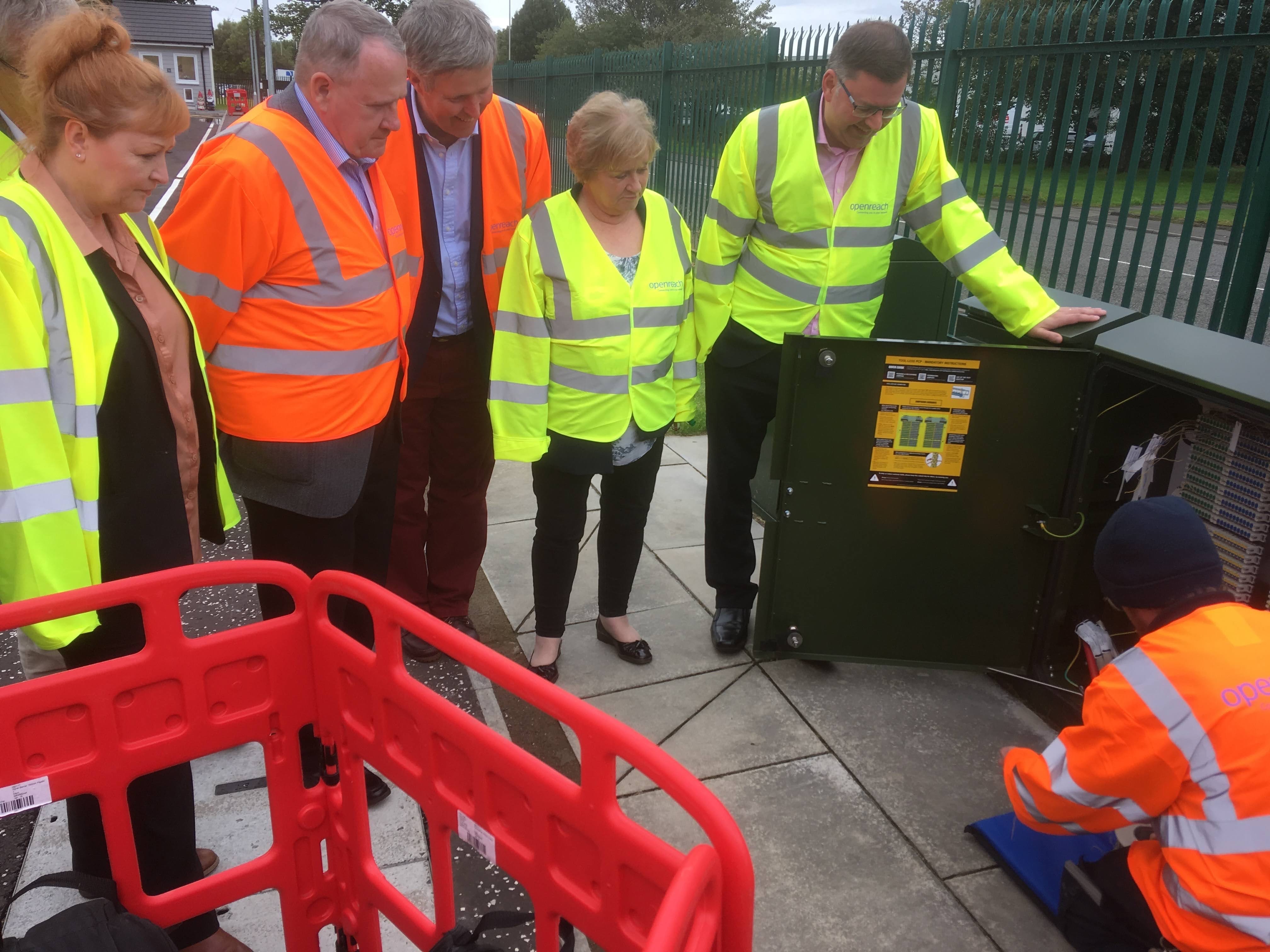
REC Committee visit to BT Openreach
Ongoing scrutiny of the Scottish Government’s digital strategy including implementation of the R100 programme to extend superfast broadband access to all by 2021 and improvements in mobile digital connectivity.
A dedicated evidence session on digital connectivity matters with Ofcom in April 2019 regarding its annual plan for 2019/20 and its Connected Nations Report 2018: Scotland.
COVID-19
During summer 2020, the Committee took evidence from Scottish Government Ministers and from a range of stakeholders in the transport, agriculture, fisheries, aquaculture and food and drink sectors regarding the impact of the COVID-19 pandemic. This included a call for written evidence issued in May 2020, which received 42 responses.
Scrutiny of public petitions
The Committee considered seven petitions during Session 5. These were as follows:
PE1236: Calling for improved road safety measures on the A90 by constructing a grade separated junction where the A937 crosses the A90 at Laurencekirk
This petition was closed on 26 April 2017 following a commitment from the Scottish Government that detailed design development work for the grade separated junction at Laurencekirk called for in the petition would be taken forward, with an indicative completion date for the project of 2021. The Committee suggests that any successor committee with responsibility for transport in Session 6 may wish to continue to monitor progress towards completion of this project and its impact on road safety.
PE1598: Calling for strengthened legislative and regulatory control of marine fish farms to protect wild salmonids of domestic and international conservation importance
This petition was closed on 12 December 2018 following completion of the Committee’s inquiry into salmon farming in Scotland. The petitioner commented positively on the Committee’s work to address the issues raised in the petition.
PE1616: Calling for a new offence of parking in front of a dropped kerb
This petition was closed on 30 October 2019 after the Scottish Government, responding to a Committee recommendation at Stage 1, brought forward proposals at Stage 2 of the Transport (Scotland) Bill for the prohibition of parking in front of dropped kerbs which was subsequently agreed by the Committee. The petition was closed on the basis that its objectives had been met.
PE1626: Calling for legislation to regulate bus services in Scotland and an inquiry into the benefits of bringing bus services in Scotland into common ownership
The Committee decided to close this petition on 17 February 2021. However, in doing so, it wrote to the Cabinet Secretary for Transport, Infrastructure and Connectivity noting that provisions in the Transport (Scotland) Act 2019 relating to the provision of local bus services by local authorities and community bodies; bus service improvement partnerships; and bus franchises had yet to be implemented and requesting information on the timescales for their commencement. The Committee suggests that any successor committee with responsibility for transport in Session 6 may wish to continue to monitor progress in the implementation of these provisions.
PE1703: Calling for superfast broadband internet access to be provided to every household and business in Scotland, particularly in rural areas, before 2021
The Committee closed this petition on 17 February 2021 but wrote to the Minister for Energy, Connectivity and the Islands highlighting the importance of the issues raised by the petition and suggesting that its successor committee may wish to continue to scrutinise these issues during Session 6.
PE 1715: Calling for the salmon farming industry solely to utilise a closed-containment method with full water filtering in Scottish waters.
This petition was also closed on 17 February 2021. In closing the petition the Committee wrote to the Cabinet Secretary for Rural Economy and Tourism noting that the technological development of closed containment methods continues to be explored by the sector and its intention to suggest to its successor committee that it may wish to continue to monitor progress in this area.
PE 1733: Calling for the Right to Food to be made part of Scots law.
In closing the petition on 17 February 2021, the Committee wrote to the Cabinet Secretary for Rural Economy and Tourism. In the letter, the Committee noted that previous proposals for a Good Food Nation Bill had been removed from the Scottish Government's legislative programme and replaced by a proposal to develop a non-statutory policy on food to include work on food rights. The Committee emphasised the importance of policy development in this area and indicated its intention to suggest that its successor committee may wish to monitor progress towards its delivery.
Outstanding and ongoing issues
The Committee recognises that its successor committee/s will have complete autonomy to consider and agree its / their own work programme. Nonetheless, the Committee has identified certain outstanding and ongoing issues from its work during Session 5, which its successor committee/s may wish to consider and, if appropriate, follow up during Session 6. On this basis, the Committee draws the attention of its successor committee/s to these pieces of work to enable consideration of whether to include these in its / their future work programme.
Implications of EU exit for the rural economy
Following the end of the transition period related to the UK’s exit from the European Union at the end of 2020, the Committee took evidence on 10 February 2021 from stakeholders regarding the ongoing impact of new post-Brexit requirements for exports on exporters and associated supply chains in Scotland’s agriculture, fisheries and aquaculture sectors.
The evidence the Committee took from stakeholders indicates that some of the difficulties currently being experienced are likely to continue for the foreseeable future and the Committee’s successor/s may wish to consider ongoing work to assess the impact these are having on Scottish exporters and Government action and the provision of Government support to address them.
Implications of EU exit for devolution and Parliamentary scrutiny
In December 2020, the Committee responded to a request for input to the Finance and Constitution Committee concerning implications of the Brexit process for the future role of the Scottish Parliament and its committees.
The Committee’s response highlighted an ongoing role for its successor/s in scrutinising Scottish Government policy decisions in areas within its remit that are intended to keep pace with – or to diverge from – the relevant provisions of EU law.
Also raised in its correspondence with the Finance and Constitution Committee, in the context of the repatriation of certain powers as a consequence of the UK’s exit from the European Union, the Committee has been in ongoing dialogue with the Scottish Government with regard to the development of a number of common frameworks for joint working between the Scottish and UK Governments in policy areas falling within the Committee’s competence.
The Committee requested and received an update from Scottish Government officials in January 2021 concerning the anticipated timetable for these common frameworks to be scrutinised by the Scottish Parliament. Subsequently, on 24 February, the Committee was copied into a letter from the Cabinet Secretary for the Constitution, Europe and External Affairs to the Convener of the Finance and Constitution Committee which confirmed that “the Scottish Government anticipates that the majority of provisional frameworks will be scrutinised by Scottish Parliament committees from September 2021 onwards.”
The Committee draws the attention of its successor/s to the significant number of common frameworks falling within the rural economy and connectivity policy remit and suggests its successor/s may wish to allocate appropriate time and capacity within its / their work programme to allow these to be scrutinised.
Finally, in its correspondence with the Finance and Constitution Committee, the Committee highlighted an ongoing and important role for the Scottish Parliament and its Committees in scrutinising the negotiation of international trade agreements, notably as these relate to areas falling within the Committee’s remit such as agriculture, fisheries and the wider food and drink sector in Scotland.
The Committee suggests that its successor committee/s may wish to consider how best to ensure ongoing and effective scrutiny in these areas during the course of Session 6.
UK internal market
While taking evidence from the UK Secretary of State for Environment, Food and Rural Affairs in November 2020 and in subsequent correspondence with the Finance and Constitution Committee referred to above, the Committee highlighted potential new challenges resulting from implementation of the UK Internal Market Act which would make it extremely important to maintain and safeguard its role and that of its successor committee/s in scrutinising the impact of the operation of the UK internal market in policy areas falling within its / their remit/s.
On 2 March 2021, the Committee received correspondence from the Chief Executive of the Competition and Markets Authority (CMA) advising that, under the terms of the UK Internal Market Act, it will establish a new Office for the Internal Market (OIM) later in 2021 with “a distinct remit within the CMA to provide technical advice to the UK government and parliament and the devolved administrations and legislatures on the smooth running of trade within the United Kingdom”.
The Committee suggests that its successor/s may wish to consider how best to factor into its / their future work programme ongoing scrutiny of the operation of the UK internal market during Session 6 as this relates to policy areas falling within its / their remit/s and that this might usefully include regular engagement with and scrutiny of the work of the new Office of the Internal Market.
Impact of the COVID-19 pandemic
During 2020, the Committee sought evidence on the impact of COVID-19 on the rural economy and connectivity in Scotland and subsequently on financial implications of COVID-19 related to connectivity and the rural economy as part of its scrutiny of the draft Scottish budget for 2021-22.
This evidence and subsequent exchanges with Scottish Government ministers have highlighted particular impacts on public transport and travel volumes and patterns, an increase in the take-up of active travel during lockdown and significantly increased reliance on digital connectivity for home working and home schooling. The pandemic has also had significant impacts on agriculture, fisheries and aquaculture, for instance as a result of the restriction or complete closure of certain markets for Scottish food and drink products and produce.
As Scotland hopefully progresses towards recovery from the impact of the COVID-19 pandemic, the Committee suggests that its successor committee/s may wish to consider how best to incorporate scrutiny of that recovery and potential longer term impacts on those sectors falling with its / their remit/s into its / their work programme for Session 6.
Climate Change Plan
Alongside a number of other subject committees, the Committee sought evidence and subsequently issued a detailed response on 4 March 2021 to the Climate Change Plan update published by the Scottish Government in December 2020.
The Committee suggests that its successor/s may wish to consider undertaking ongoing scrutiny of the final version of the Climate Change Plan update and its implementation as this relates to the rural economy and connectivity during the course of Session 6.
Future of rural policy
As outlined elsewhere in this report, during Session 5, the Committee had lead responsibility for the passage of the Agriculture (Retained EU law and data) (Scotland) Bill. In the context of the UK’s exit from the European Union, this legislation provides the Scottish Ministers with regulation-making powers to amend or replace the European Union (EU) Common Agricultural Policy (CAP) elements of retained EU law in Scotland. It creates a framework for a period of stability and simplicity in rural policy, leading up to the development and adoption of a new rural policy for Scotland to be introduced no later than the end of 2024.
The Committee draws the attention of its successor/s to ongoing work by the Scottish Government to develop a new rural policy for Scotland and suggests that it may wish to consider how to continue to monitor progress in this area as part of its Session 6 work programme, including detailed scrutiny of the contents of this new policy when it is brought forward.
Food policy / Good Food Nation
The Scottish Government originally announced plans to begin consultation on bringing forward a Good Food Nation Bill in its 2016-17 Programme for Government. It subsequently announced plans to introduce the Bill in its 2019-20 Programme for Government. However, as a consequence of the COVID-19 pandemic, plans for introducing the Bill were subsequently removed from the legislative programme, with the Scottish Government instead committing itself to set out a Statement of Policy on Food.
Giving evidence to the Committee on 3 March 2021, the Cabinet Secretary for the Rural Economy and Tourism said he anticipated that the Statement of Policy on Food would take some time to prepare and would most likely be a matter to be considered during Session 6.
In particular, the Committee’s recent scrutiny of the Climate Change Plan update has highlighted the continued importance of an integrated approach to food policy and the important role of a Good Food Nation Bill in providing a framework for such an approach. In this context, the Committee draws the attention of its successor/s to ongoing commitments from the Scottish Government to applying the principles of a Good Food Nation and suggests it / they may wish to factor ongoing scrutiny of food policy, including the potential introduction of a Statement of Policy on Food and a Good Food Nation Bill, into its / their work programme for Session 6.
Crofting
In its 2016-17 Programme for Government, the Scottish Government committed to beginning to engage with crofting stakeholders to draft a National Development Plan for crofting, which would inform a Crofting Bill to be brought forward later in Session 5. As detailed elsewhere in this report, on the back of this commitment, the Committee undertook a focused inquiry to consider priorities for reform of crofting law in late 2016 / early 2017. On 11 October 2019, the Cabinet Secretary for Rural Economy and Tourism wrote to the Committee to announce that, due to a reallocation of staffing resources, the Scottish Government no longer had plans for the foreseeable future to introduce a Crofting Bill.
Addressing the current status of the National Development Plan for Crofting and the crofting reform agenda on 3 March 2021, the Cabinet Secretary for Rural Economy and Connectivity said that it remained his intention to publish the Plan before the end of Session 5. On 19 March 2021, the Cabinet Secretary wrote to the Committee advising that the National Development Plan for Crofting had been published.
The Committee draws the attention of its successor committee/s to the commitments given with respect to advancing crofting reform and suggests that the progress of such reform may be a subject that is considered appropriate for ongoing scrutiny during Session 6.
Women in Agriculture
During Session 5, the Scottish Government established a Women in Agriculture Taskforce which produced its final report in November 2019. In December 2020, the Committee took evidence from members of the Taskforce, exploring issues raised in the report. The Committee subsequently wrote to key sectoral stakeholders to request information on how they have responded - or how they intend to respond - to any of the Taskforce report recommendations and received two responses.
The Committee highlights the work of the Women in Agriculture Taskforce to its successor/s and suggests it / they may wish to consider continuing to monitor implementation of the Taskforce’s key recommendations during Session 6.
Salmon farming and aquaculture policy
As outlined elsewhere in this report, the Committee undertook a detailed inquiry into salmon farming in Scotland during Session 5, as well as considering two petitions related to this subject. The Committee also took evidence in late 2020 on progress towards implementing the recommendations contained in the Committee’s inquiry report. The Committee was very disappointed by the apparent limited extent of progress in implementing these recommendations, two years after the report’s original publication.
On this basis, the Committee is of the view that there is still a great deal of work to be done to address the issues raised during its inquiry and suggests that its successor/s may wish to consider following up on these matters during Session 6 and undertaking continued scrutiny of the regulation, performance and sustainability of Scotland’s aquaculture sector.
Inshore fisheries
At the beginning of Session 5, the Scottish Government made a specific commitment to bring forward legislation to modernise management of Scotland’s inshore fisheries. However, this legislation has been subsequently delayed and is yet to be introduced.
Asked about the current status of this legislation while giving evidence to the Committee on 3 March 2021, the Cabinet Secretary for Rural Economy and Tourism simply remarked that this had been "impeded by Brexit and Covid".
The Committee draws the attention of its successor/s to the continued need for action, including through specific legislation and improved spatial management, to modernise management of Scotland's inshore fisheries and suggests that it / they may wish to factor ongoing scrutiny of these matters into its / their work programme for Session 6.
Digital connectivity
The R100 programme was first established by the Scottish Government in 2017 as a follow-on programme to Digital Scotland Superfast Broadband (DSSB) with an aspiration to extend superfast broadband connectivity to 100% of Scottish premises by the end of the 2021-22 financial year (i.e. March 2022).
Since the Scottish Government has no legal or regulatory responsibility for telecommunications, given the reservation of such powers to UK Ministers under the Scotland Act (1998), it is intervening in this area using devolved powers in respect of economic development.
In August 2020, the Committee was advised by the Minister for Energy, Connectivity and the Islands that work was underway on contracts with BT for delivery of the Central and South Lots of the R100 programme. Following an unsuccessful legal challenge, the contract for delivery of the North Lot, also by BT, was signed on 11 December 2020.
As a result of various challenges and delays, the contract build of the R100 programme will no longer be completed by March 2022. However, in an effort to honour its original policy commitment, on 12 September 2020, the Scottish Government launched the Scottish Broadband Voucher Scheme which is open to anyone unable to access superfast broadband by the end of 2021.
The Committee suggests that its successor committee/s may wish to consider allocating time and capacity to undertake ongoing scrutiny of implementation of the R100 programme and other aspects of Scottish Government policy on digital connectivity, which could usefully include ongoing engagement with Ofcom as the responsible regulator for communications services in the UK.
National Transport Strategy for Scotland 2 (NTS2) / Strategic Transport Projects Review 2 (STPR2)
The Scottish Government's National Transport Strategy for Scotland (NTS2) was published on 5 February 2020 and sets out a long term vision for the development of a sustainable, inclusive, safe and accessible transport system over the next 20 years.
NTS2 is accompanied by a delivery plan, the first version of which covers the period 2020-2022.
The Scottish Government's Strategic Transport Projects review 2 (STPR2) is currently under development and will build on the policies set out in NTS2, identifying the Scottish Government's priority transport projects and programmes over the 20 year lifetime of NTS2.
The Committee draws the attention of its successor/s to the forthcoming publication of STPR2 and suggests it / they may wish to consider allocating time and capacity to scrutinising it once published as well as undertaking ongoing scrutiny of the current and future iterations of the delivery plan for NTS2.
Transport infrastructure
As outlined elsewhere in this report, as part of its scrutiny of the 2020-21 draft Scottish Budget, the Committee examined the current approach to road maintenance in Scotland and the adequacy of related funding levels. Subsequently, the 2021-22 draft Budget included a commitment to a significant increase in the Motorways and Trunk Road budget heading as a result of increases in the structural repairs and Network Strengthening budgets.
In early 2019, the Scottish Government engaged the independent Infrastructure Commission for Scotland to undertake an 18-month commission to advise on a 30-year long term strategy and its delivery for Scotland's infrastructure. Subsequent to the Committee's budget scrutiny work on road maintenance in late 2019, the Infrastructure Commission for Scotland published its key findings report in January 2020.
The two most significant road enhancement projects currently ongoing in Scotland are the dualling of the single carriageway sections of the A9 between Perth and Inverness, due for completion by 2025, and dualling of the single carriageway sections of the A96 between Inverness and Aberdeen, which has a target completion date of 2030.
During Session 5, the A83 trunk road at the Rest and be Thankful has been subject to a series of lengthy closures due to land slips and concerns about further ground movement during periods of heavy rain. Through the Access to Argyll (A83) Project, the Scottish Government has made a commitment to delivering a permanent engineering solution to this issue.
The Committee wishes to highlight for the benefit of its successor/s the importance of ongoing scrutiny of transport infrastructure. The Committee suggests that its successor committee/s may wish to consider how both the development and implementation of a long term strategy for Scotland's infrastructure and the delivery of individual major infrastructure projects can be effectively scrutinised during the course of Session 6.
Road Safety Framework
On 25 February 2021, the Scottish Government published its Road Safety Framework to 2030 which "embeds the Safe System approach to road safety delivery", encompassing five pillars, namely safe road use, safe vehicles, safe speeds, safe roads and roadsides and post-crash response. The Committee suggests that its successor committee/s may wish to allocate time and resources towards ongoing scrutiny of the implementation of the Road Safety Framework during Session 6.
Ferry procurement and future ferries policy
As outlined elsewhere in this report, during Session 5, the Committee undertook an inquiry into the construction and procurement of ferry vessels in Scotland and published its final report in December 2020. The remit of this inquiry included consideration of the timetable and costs for completion of vessels 801 and 802 to serve the Clyde and Hebrides ferries network by the Ferguson Marine shipyard.
In its concluding inquiry report, the Committee recommended that Audit Scotland should, as soon as possible, undertake an audit of the financial management of the design and build contract for vessels 801 and 802 and should also investigate and report on the processes followed by the Scottish Government in granting and administering £45 million in commercial loans to the Ferguson Marine shipyard during 2017 and 2018. On 16 March 2021, Audit Scotland wrote to the Committee acknowledging the relevant recommendations from the inquiry report and setting out how it intends to address these as part of its work programme for 2021/22.
On 3 March 2021, the Committee took evidence from the Minister for Energy, Connectivity and the Islands and the Turnaround Director at Ferguson Marine (Port Glasgow) Ltd. on the latest state of play regarding cost and timetable for completion of vessels 801 and 802 and broader ferries policy questions.
At time of writing, the Committee is still awaiting an update on cost and timetable for completion of vessels 801 and 802 in light of impacts on operations at the yard arising from the COVID-19 pandemic.
The Scottish Government has given a commitment to carry out a review of the current tripartite decision-making structure that governs the procurement of ferries. Giving evidence to the Committee on 3 March 2021, the Minister for Energy, Connectivity and the Islands said that he expected work on the tripartite review to take six to nine months and that, on this basis, it would be completed in late 2021. The Minister subsequently wrote to the Committee on 11 March 2021 advising that a contract for completion of the review had been awarded to Ernst and Young LLP with legal support from MacRoberts LLP and that work on the review was already underway.
The Committee draws the attention of its successor/s to the investigation it specifically recommended should be undertaken by Audit Scotland with respect to vessels 801 and 802 and the Ferguson Marine shipyard, the Scottish Government’s commitment to provide regular updates regarding ongoing work to complete vessels 801 and 802 and its separate commitment to review the current tripartite decision-making structure for ferry procurement.
The Committee suggests that, in formulating its / their future work programme, its successor committee/s may wish to consider what time and capacity it / they may wish to commit to ongoing scrutiny of these matters and ferries policy more broadly.
Rail services
On 18 December 2019, the Scottish Government announced plans to terminate the current ScotRail franchise at its first end date of March 2022. Meanwhile, the UK Government has committed to ending the current franchising system although timings for this remain unclear pending the outcome of the Rail Review led by Keith Williams and amid ongoing uncertainty related to the COVID-19 pandemic.
In light of this ongoing uncertainty, the Scottish Government indicated in its Franchising Policy Statement, published on 4 March 2021, its intention to directly award a new contract for the provision of rail services in Scotland in the event that the future shape of rail services in the UK has still to be resolved at the point the current ScotRail franchise expires in March 2022.
Giving evidence to the Committee on 10 March 2021, the Cabinet Secretary for Transport, Infrastructure and Connectivity indicated his intention to update Parliament prior to dissolution regarding the Scottish Government's plans for managing rail services in Scotland after termination of the current ScotRail franchise in March 2022. On 17 March 2021, the Cabinet Secretary gave an update to Parliament in which he confirmed the Scottish Government’s intention that an operator of last resort would run ScotRail services after the end of the current franchise contract and that this should take the form of an arm’s-length company owned and controlled by the Scottish Government.
During Session 5, the Office of Road Rail has regularly provided the Committee with useful operational and performance data to assist its ongoing scrutiny of rail services in Scotland.
The Committee draws the attention of its successor committee/s to the Scottish Government's proposal that an operator of last resort would run ScotRail services after the end of the current franchise contract. It suggests that it / they may wish to undertake scrutiny of this proposal as part of its / their future work programme and to conduct ongoing monitoring of the performance of rail services in Scotland more generally during Session 6.
Prestwick Airport
Since taking public ownership of Prestwick Airport in 2013, the Scottish Government has made ongoing attempts to sell the airport to a private sector bidder. During 2020, sale negotiations progressed with an unnamed preferred bidder but the sale ultimately fell through and the airport went back on sale on 5 November. On 23 February 2021, the Scottish Government advised the Committee that it had accepted a recommendation to appoint a new preferred bidder.
During the period of public ownership, the Scottish Government has provided loans to TS Prestwick HoldCo with a total value of £43.4 million.
The Committee draws the attention of its successor/s to the status of Prestwick Airport as wholly owned by Scottish Ministers and suggests that, in its / their future work programme, it / they may wish to consider undertaking continued scrutiny of the performance of the airport and ongoing efforts to sell it back into private sector ownership.
The Queensferry Crossing
Subsequent to its opening in August 2017, the Queensferry Crossing has been subject to closure on a number of occasions due to the risk of ice that has accumulated on its cables falling onto vehicles on the carriageway. Sensors to detect build-up of ice on the bridge cables were fitted in July 2020. Bridge maintenance company BEAR Scotland has been testing implementation of an emergency diversion to the old Forth Road Bridge in the event of ice-related closure of the Queensferry Crossing.
The Committee suggests that its successor/s may wish to undertake ongoing scrutiny of the issue of the potential future closure of the Queensferry Crossing due to ice build-up during Session 6 and any further steps that may be required to find a permanent solution to this issue. Its successor/s may also wish to continue to monitor, in more general terms, the operation and management of both this key piece of transport infrastructure and the Forth Road Bridge which forms a complementary public transport/active travel corridor.
Transport (Scotland) Act 2019
In the course of 2020/21, it has become apparent that the timescales for introducing secondary legislation required to bring certain provisions of the Transport (Scotland) Act 2019 have been delayed. For instance, on 26 August 2020, Transport Scotland announced that Low Emission Zones (LEZs) will not be introduced until February 2022.
Furthermore, the introduction of a ban on pavement and dropped kerb parking, which was a provision specifically introduced to the legislation by the Committee during its passage, has also been delayed as have certain key bus-related provisions of the Act.
The Committee suggests that its successor committee/s may wish to continue to monitor implementation of these and other provisions of the Transport (Scotland) Act 2019 and any further delays to their introduction as part of its / their Session 6 work programme.
Engagement
The Community Outreach team in partnership with members of the Scottish Youth Parliament (SYP) delivered a workshop at their Annual Sitting in October 2019 on behalf of the Rural Economy and Connectivity Committee ‘Reaching 100% (R100) Scottish Government project to deliver superfast broadband to every property in Scotland by 2021’. SYP also conducted a Survey entitled ‘What’s Your Take’ incorporating views from young people across Scotland.
The Community Outreach team delivered a workshop on Digital Connectivity in partnership with Haddington Citizen’s Advice Bureau. The Scottish Older People’s Assembly (SOPA) event took place in October 2019 at the Scottish Parliament. This workshop was attended by committee member Stewart Stevenson MSP. More information is available in the SOPA Report.
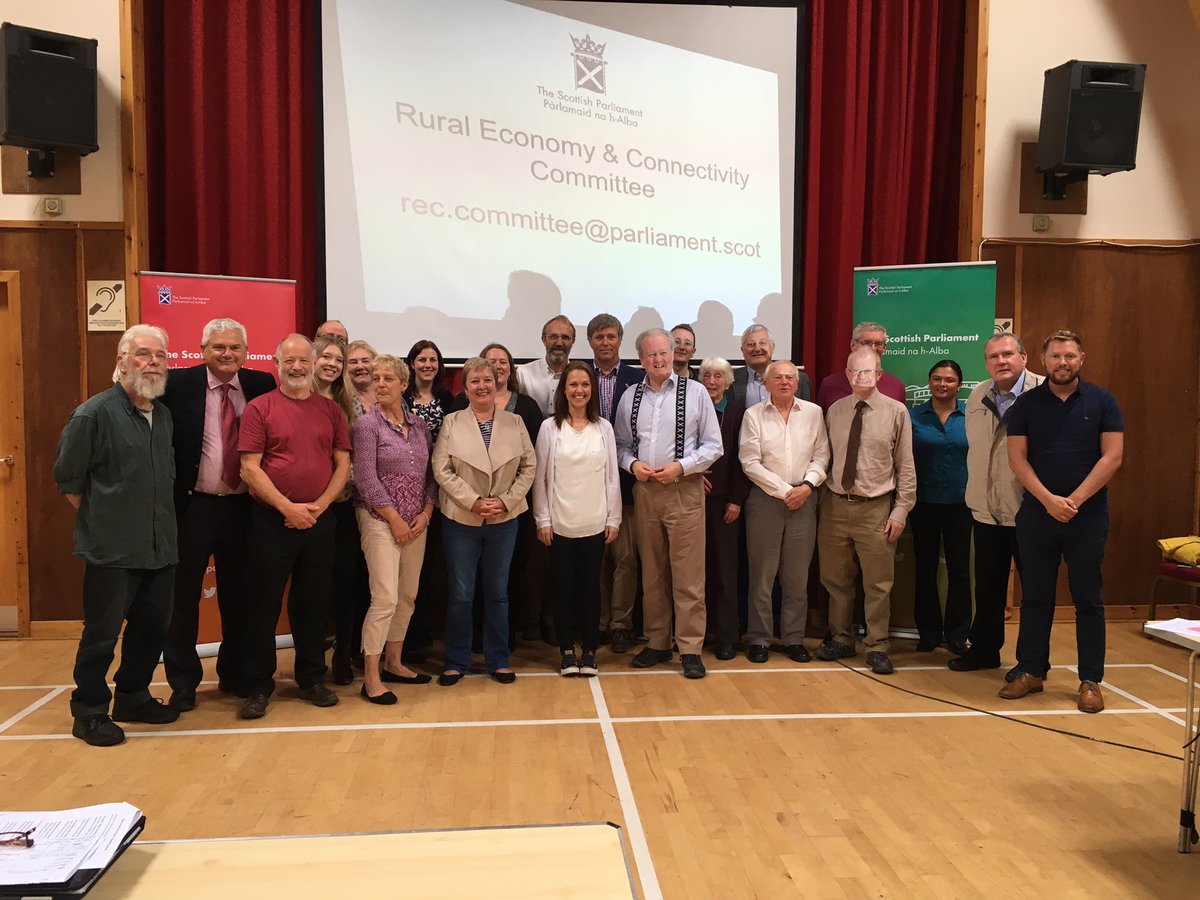
REC Committee community meeting in Craignure, Isle of Mull
Community Outreach supported the Committee in their scrutiny of the Islands Bill by arranging a community meeting in Craignure on the isle of Mull as part of the Committee visit. Community Outreach promoted the Committee’s external meeting in Kirkwall, Orkney among local contacts in order to generate an audience and arranged a video conference with islands-based students at the University of the Highlands and Islands and general promotion of the Bill on other Islands.
The Education Service supported the committee in consulting young people across Scotland about the Seat Belts on School Transport (Scotland) Bill. They tailored outreach sessions to look at the bill and created a survey to gather structured feedback from over 300 pupils. The data was gathered in a diverse group of ten schools in urban and rural areas. This was supplemented with an ‘indicative’ vote amongst nearly 1000 pupils visiting parliament for education sessions, on a ‘yes/no’ vote, for a wider but less in-depth overview of young people’s attitudes to the issue.
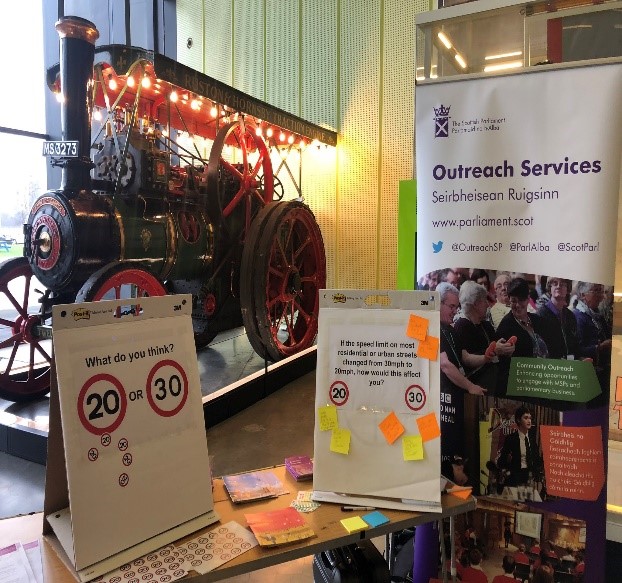
Restricted Roads (20 mph Speed Limit) (Scotland) Bill: Pop up stall at Riverside Museum, Glasgow
The Community Outreach team had three pop up stalls in the Overgate Shopping Centre in Dundee, Riverside Museum in Glasgow and the National Tyres garage in Dunfermline to gather views on the Restricted Roads (20 mph Speed Limit) (Scotland) Bill.
Remit and working practices
Inquiries
The REC Committee was successful in undertaking meaningful and substantive scrutiny as part of the two major inquiries it has been able to hold during Session 5, namely on ferries and salmon farming. Both of these inquiries resulted in strong recommendations for change which highlighted what can be achieved when committees are able to allocate sufficient time to conduct forensic scrutiny where this is justified.
The Committee also undertook a smaller inquiry, earlier in the session, on crofting reform, although the overall policy impact of that work is less clear as the Scottish Government has still to bring forward its proposals for legislative change.
Overall, it has been disappointing that the Committee has only succeeded in conducting two major inquiries and one smaller scale inquiry over the five year lifetime of the Parliament. However, this can be attributed to the broad remit of the Committee and the sheer volume of legislation and subordinate legislation (notably as a consequence of Brexit) that the Committee had to deal with during that time.
Committee size, remit and workload
The volume of legislation and subordinate legislation the Committee has had to deal with and prioritise, particularly during the latter part of the session and related to Brexit, has severely limited the scope for the Committee to undertake effective scrutiny.
The huge breadth of the Committee’s remit has also inevitably resulted in time and resources being spread very thinly and the depth and quality of scrutiny has also suffered as a result. This has given rise to a constant feeling that the Committee has only ever been able to “scratch the surface” of the huge range of policy areas (agriculture, fisheries, aquaculture, digital connectivity and transport policy, all major policy areas in their own right) within that remit.
Looking ahead to Session 6, it is to be anticipated that the volume of policy work to be undertaken in each of these individual policy areas, notably as a consequence of Brexit and the COVID-19 pandemic, will only intensify. Taking agriculture as just one example, the UK’s departure from the Common Agricultural Policy will necessitate the development and implementation of an entirely new policy in an area that is devolved and which will require ongoing, serious and detailed scrutiny.
The size of the Committee’s remit and the huge workload this has generated have also severely restricted or eliminated completely the scope to undertake post-legislative scrutiny of legislation enacted in previous parliamentary sessions.
Balancing the varied individual subject interests and expectations of a Committee of eleven members has also proved challenging. The fact that several Committee members have simultaneously been members of one or two or even three other committees has constrained the time these members are able to commit to the REC Committee and has therefore created further challenges in managing the Committee’s work.
On this basis, the Committee recommends that its successor committee/s should take due account of the following considerations in determining its / their approach to effective scrutiny during Session 6 as this relates to Committee size, remit and membership:
The Committee has found that eleven-member committees are too large to be optimal for effective scrutiny and considers that, within the context of future committee remits, the Parliament should aim to reduce the maximum size of Committees during Session 6;
The Committee believes that wide remits of committees, such as that of Rural Economy and Connectivity during Session 5, should be avoided. If remits are too broad, the Committee takes the view that this is likely to restrict the detailed scrutiny that many individual policy areas deserve and will increasingly require as policy development in those areas inevitably gathers pace during the next session of the Parliament;
The Committee is of the view that reducing the size and narrowing the remits of committees would provide greater space for more in-depth scrutiny, particularly in the form of inquiries and post-legislative scrutiny. It further considers that the Parliament as an institution should take a much stronger, more proactive role in recommending a committee structure which is best placed to deliver the most effective scrutiny across all policy areas, as opposed to necessarily mirroring the portfolios of Cabinet Secretaries;
To enable the necessary time and effort to be committed to effective scrutiny, the Committee believes that individual membership should be limited (ideally) to one and certainly no more than two parliamentary committees at any one time;
Finally and importantly, given the increasing breadth and volume of policy issues the Parliament will inevitably be confronted with during Session 6, the Committee considers it imperative that clerking, SPICe and other support for committees is appropriately resourced to enable the Parliament to undertake effectively its core function of scrutinising the Scottish Government.
Financial scrutiny
Specifically in relation to the role of subject committees in undertaking financial scrutiny, the Committee’s experience has been that these exercises have taken up valuable limited time and resources with no tangible outcome, influence or impact on the Scottish Government’s ensuing spending priorities. In that context, the added value of set-piece financial scrutiny by the Parliament’s subject committees, even under the recently revised process, is highly questionable.
Based on this experience, the Committee takes a view that, while continuing to undertake ongoing financial scrutiny within their remit, subject committees should no longer be expected to commit limited time and resource to undertaking stand-alone pre-budget scrutiny. The Committee suggests that they should instead aim to include a financial scrutiny element in all aspects of their work throughout the year, as appropriate.